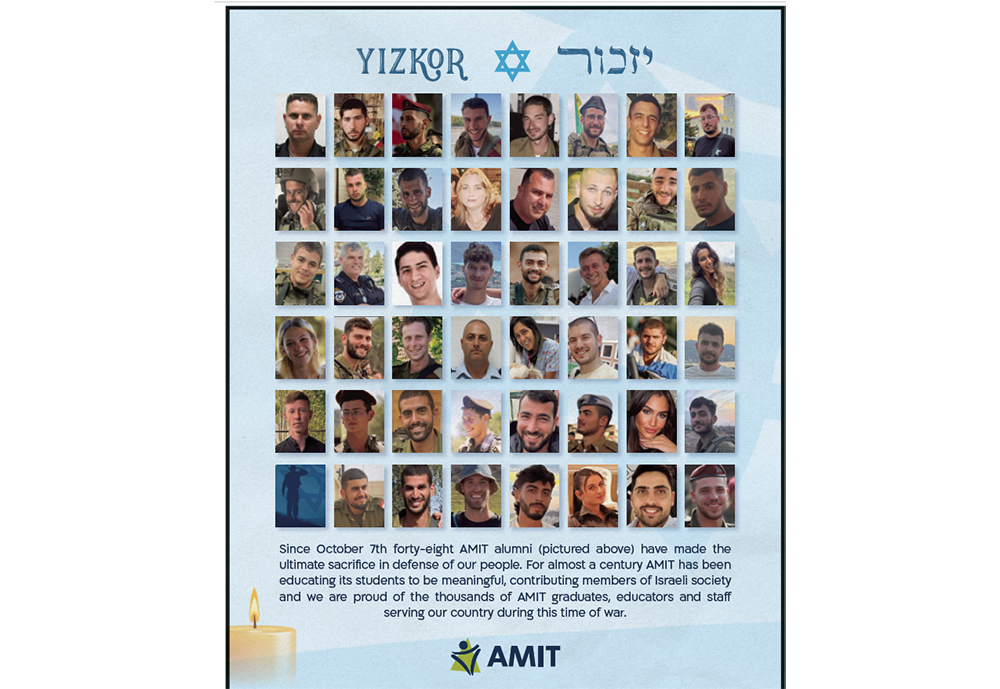
AMIT Children has always been touted as promoting Jewish values. It’s part of our mission statement, core to our century-old organizational narrative and, at the end of the day, our raison d’etre.
But like the term “tikkun olam,” the term Jewish values is greatly over/misused and as a result, it fails to resonate. At all. At Yeshiva College legendary English professor Dr. William Lee railed against the use of the word “important.” “What isn’t important?” he would thunder, “It’s the most overused word in the English language!” Of late, we have even seen the term bastardized by the intellectually pathetic Jewish pro-terrorist demonstrators who use it as license to protest against their people.
Is it possible to re-energize words — to give Jewish values a meaning again? A year ago, well before the Oct. 7 nightmare war emerged as daily life, I visited AMIT Or Akiva. Or Akiva is a rarity in the AMIT network: where many of our schools serve a dati leumi population, Or Akiva is a secular vocational school in a small city near Caesarea. The student population of 150 is considered at extremely elevated risk during usual times and the school, knowing that free time is a great danger, was one of the first to reopen in Israel during the war. It is a “last chance” school — meaning that students have either failed miserably in other schools (sometimes many) or are referred to us by the police or court system as a final effort to correct a teenager’s downward spiral to oblivion.
My AMIT school visits are fairly template; I meet the administration and teachers, tour the facility, hear their challenges/wants/needs, connect with the students, and often meet with a representative from the city as well. (Each city/region in Israel has an education director who is a critically important partner, so much so AMIT will not partner to operate a school unless it has confidence in that professional). I learn about the uniqueness of the school and make connections, and then my job is to help them in any way possible, sometimes by steering program funding but often it is as simple as expressing to the staff our appreciation for their work. It is not hard: the measurable outcomes of most last chance schools like Or Akiva in terms of students passing the Bagrut and entering Tzahal/National Service is well above the national average. In short, our remarkable staff take very broken kids with all sorts of problems and fix them.
The discussions with the staff are enlightening and exhaustive and there is a lot of drilling down that takes place. Because of the partnership of our supporters worldwide it is common for these conversations to lead to solutions in terms of more resources, programming, or as we say, “tachlis” in terms of meeting student and staff needs in a direct, speedy and straightforward fashion. Since Israelis are among the warmest people in the world (and respect the “tachlis” factor) friendships often develop.
But not this day. The education director for the city, Sigal, and I just did not hit it off. The school very much wanted to open a vocational culinary track and Sigal did not agree. I advocated strongly for it, and she and I got into it a bit. What quickly became apparent was that the proposed program was not the true concern. Sigal was, fairly, doubting AMIT’s ability to effectively run a secular school in a secular city. The discussion turned quickly to the assertion that this generation lacks values — “interested only in TikTok and their iPhones” — and what values can AMIT possibly teach? And if so, how do you prove it?”
A heated conversation ensued and let us just say she was not inviting me for Shabbat dinner when the day ended. That said, after a few months of back and forth she was persuaded and the culinary track was opened.
But her last question was the real rub: How do you prove AMIT inculcates our students with Jewish values? What measurable outcomes exist? U.S. organizations use the intermarriage rate, attendance at Jewish day schools/camps, synagogue membership (or whatever barometer matches their organizational agenda). But in Israel? A hard measure? Not simple at all because there are so many additional factors simply by living in Israel that influence outcomes.
But there is one that will resonate harshly with all of us — in the current war (as of this writing and please God let it be the last) 48 AMIT alumni have died in combat. Almost every single one was an officer, commander or member of the most elite combat units; every single one of them a volunteer because the best units accept only those who want to be there. That is 48 out of the national total of holy souls killed in action since Oct. 7, a highly disproportionate number attributable only to their desire to serve the Jewish state at the highest possible level and accepting the potential sacrifice being asked of them.
At AMIT we teach Jewish values. In what is the most horrific and tragic measurable outcome imaginable that sometimes means dying for them. Hashem Yikam Damo.
Andy Goldsmith is the executive vice president of AMIT Children. He can be reached at andrewg@amitchildren.org.








